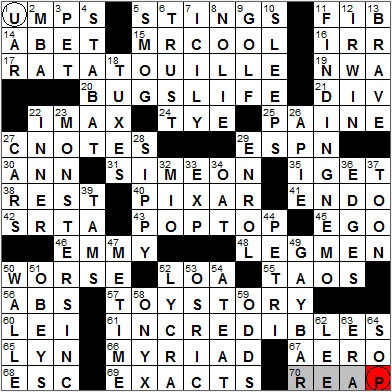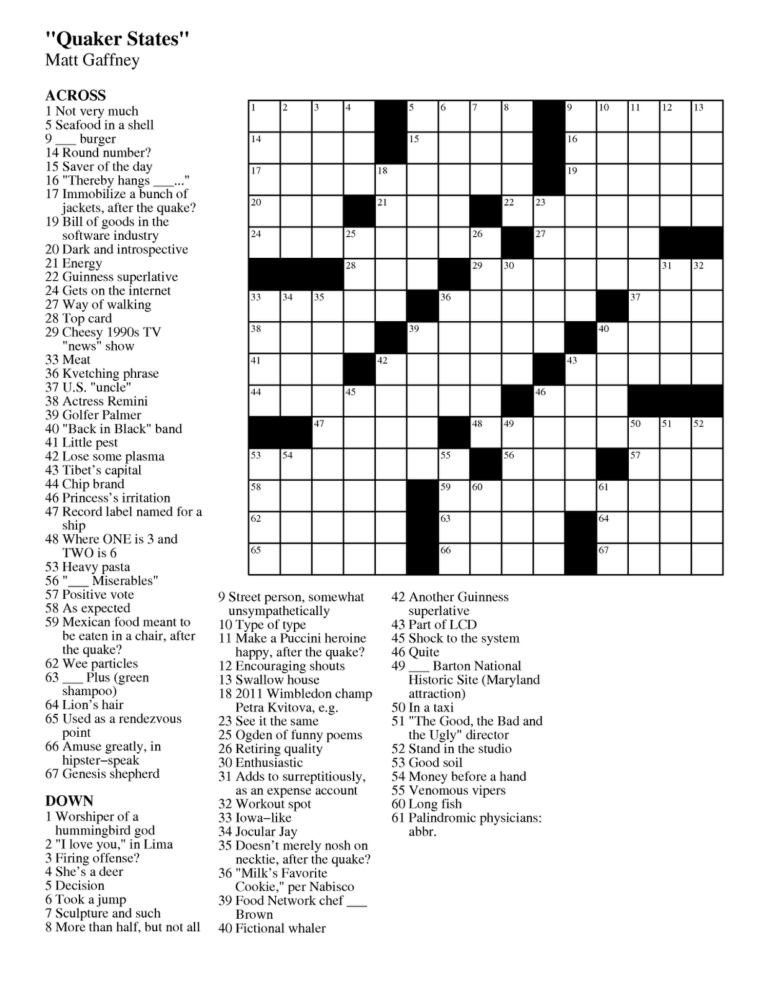
"Most of the time, I have a theme to begin with, or at least an area. I can usually complete a simple puzzle in a matter of hours, whereas a medium or hard puzzle could take a day or two." 'Writer's block could sometimes be an issue' I've had puzzles take me mere hours to create I've had others take weeks. "How long a puzzle takes to create depends on a lot of things - the size, difficulty level, whether there are any particular constraints, and so on. In a harder puzzle, you want those ambiguities, and you also want to throw in some wordplay to keep solvers a little bit off-balance. In an easy puzzle, the goal is to make clues without multiple possible answers (a 5-letter word for 'Fast' might be 'RAPID or 'QUICK' or 'HASTY' or several other things). After the grid is done, then it's time to clue. "Difficulty level should come from the cluing, not the words in the puzzle. Sometimes, as with the Daily Celebrity Crossword, you want everything to be solvable even by someone who has never solved a crossword before other times you can have the vocabulary be a little more difficult, but you never want it to be truly obscure. "The goal is to have every word in the grid be something that the solver will recognize. This is not always easy - you want to make sure that you don't have too many places that will be tricky to fill in later, or where you'd have to resort to hard words to fill it in." 'The next step is filling in the rest of the grid'

"After the puzzlemaker places the theme entries into a grid, they then decide where the rest of the black squares should go. "The first thing that a puzzlemaker has to do is come up with theme answers that will fit properly in the grid, since all crossword grids have symmetrical patterns. "Puzzles typically begin with the 'theme' - the thing that the longest answers in the puzzle have in common. I wasn't as keen as all the EINS ESTE HWYS ICI glue required to hold the longer material together, but there was enough color here and there to make it a worthwhile solve.'Here's how the puzzlemaking process works. If it hadn't been for his picture, I'd have guessed Joseph was much older, what with MAKE LOVE NOT WAR and CASSETTE PLAYER, but it's neat to see younger folks embracing interests of different generations. ODD DUCK features the interesting triple D, Jake wants to be Optimus Prime of the AUTOBOTs when he grows up (Tess is his Megatron), and YALE LAW / RAGTOPS are both sparkly entries. I enjoyed much of Joseph's mid-length material, rarely an easy task to squeeze a ton of juice out of these slots. Only a few solvers kvetched to me about the three BASEs I imagine it'll be the same today. Having a third star in ON STAR should be grounds for a revision, but then again, this isn't the first time Will has let this sort of thing slide. This seems ludicrous, as there's no shared etymology.
#CROSSWORD NYTIMES MOVIE#
Some solvers have complained to me about things like MOVIE STAR crossing START ME UP. That might seem arbitrary, but all "dupe rules" are arbitrary. However, he generally won't allow the offender by itself - in this case, STAR and SUPERSTAR would be a no-no. Will Shortz calls this a "quasi-dupe," where the word STAR is part of other phrases, and he doesn't care that much about quasi-dupes.


Some will wonder, aren't SUPERSTAR and STARDOM egregious dupes? Short answer is no. Maybe I shouldn't be surprised that Tess calls Jake "Judas."


 0 kommentar(er)
0 kommentar(er)
